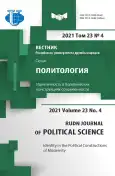The Revolution is Over, Forget It: To the 30th Anniversary of the Russian Federation
- 作者: Nisnevich Y.A.1
-
隶属关系:
- National Research University Higher School of Economics
- 期: 卷 23, 编号 4 (2021): Identity in the Political Constructions of Modernity
- 页面: 545-559
- 栏目: THE DIMENSIONS OF IDENTITY IN MODERN RUSSIA
- URL: https://journal-vniispk.ru/2313-1438/article/view/322093
- DOI: https://doi.org/10.22363/2313-1438-2021-23-4-545-559
- ID: 322093
如何引用文章
全文:
详细
After the collapse of the Soviet Union, the power in post-Soviet Russia was seized by the leaders of the democratic movement - “first wave democrats”, and the more progressive Soviet nomenclature. As a result of the miscalculations made by the leaders of the democratic movement, the representatives of the Soviet nomenclature soon started displacing the “first wave democrats” and the reformers of the “Gaidar call” from the Russian governmental bodies in order to gain full control over the governance in the country. This appeared to be a manifestation of the more general and fundamental process, where the Russian nomenclature separated from the democratic movement, emerging as a new ruling stratum - the immediate heir to the Soviet nomenclature. The turning point, which accelerated the separation and the retreat of the Russian nomenclature from liberal and democratic principles of the country’s modernization, was the beginning of the Chechen tragedy in 1994. Not only did the Chechen events separate the Russian nomenclature and the democratic movement but also split the democratic movement itself. The goal of the article is to examine the transformation of the relationship between the democratic movement and the soviet and, later on, Russian nomenclature during the revolutionary changes of the early 1990s.
作者简介
Yuliy Nisnevich
National Research University Higher School of Economics
编辑信件的主要联系方式.
Email: jnisnevich@hse.ru
ORCID iD: 0000-0001-9911-9623
Full Professor, Doctor of Political Science, professor, Department of Politics and Governance
Moscow, Russian Federation参考
- Dushenko, K. (2020). Quotes from Russian history. From the vocation of the Varangians to the present day. Litres. (In Russian).
- Gaidar, E.T. (1996). Days of defeat and victory. Moscow: Vagrius. (In Russian).
- Goldstone, J. (2006). Toward a Fourth Generation of Revolutionary Theory. Logos, (5), 58-103. (In Russian).
- Golovlev, V.I., & Nefedova, T.I. (2000). State Duma Second Convocation: Role and Place In Political Turn. Moscow: Noosfera Foundation. (In Russian).
- Khenkin, S.M. (1997). “Party of Power”: Touches to the Portrait. Politeia, 1, 28-35. (In Russian).
- Koryakin, Y. (2007). Change of beliefs (From the “Diary of a Russian reader”). Znamya Magazine. № 11. Retrieved February 17, 2021, from http://znamlit.ru/publication.php?id=3420. (In Russian).
- Nisnevich, Yu.A. (2015). Regeneration of the nomenclature as a ruling social order. Preprint WP14/2015/03. Moscow: HSE Publishing House. (In Russian).
- Nisnevich, Yu.A. (2018). The revolt of the soviet masses: political and anthropological analysis. Public Sciences and Contemporary World, 2, 127-139. (In Russian).
- Orlov, O.P., & Cherkasov, A.V. (Eds.). (1998). Russia - Chechnya: a chain of mistakes and crimes. Moscow: Zvenya. Retrieved February 17, 2021, from https://memohrc.org/ru/books/rossiya-chechnya-cep-oshibok-i-prestupleniy (In Russian).
- Ortega-i-Gasset, J. (2003). The Revolt of the Masses. Moscow: AST Publishers. (In Russian).
- Poptsov, O. (1995). Chronicle of the Times of “Tsar Boris”. Moscow: Top Secret. (In Russian).
- Yeltsin, B. (1994). Notes of the President. Moscow: Ogonek Publishing House. (In Russian).
补充文件









